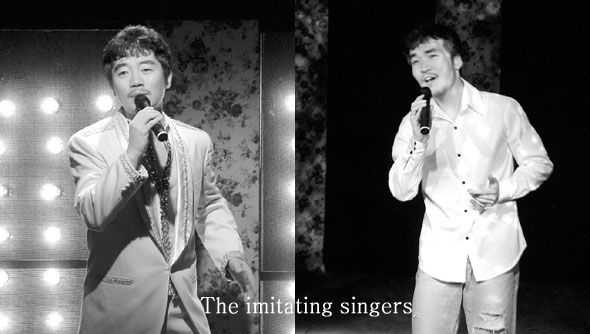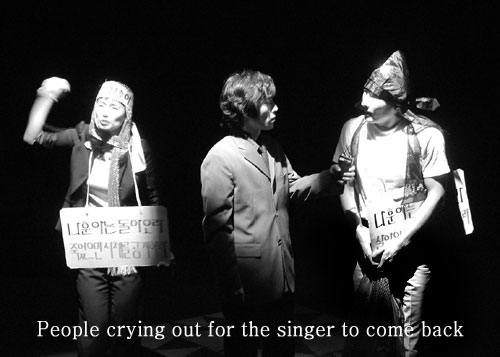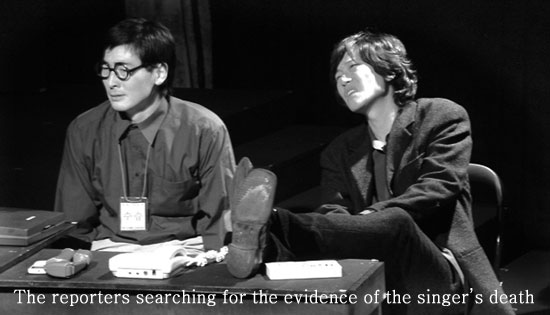 | ||
Are we original?
The play, The National Imitating Singer Contest, is first performed in Arirang Theatre from Nov. 4, 2004 to Jan. 2, 2005. Imitation has been a culture since long ago in Korean society. However, as this culture became a big social issue, people started to get confused whether they were the original ones living the original life or not. What is fake and what is true? The play tells the story about fake and true lives. The imitating culture, which is occuring in our daily lives, could be seen on stage. By expressing a complicated social issue in a concise way, the play is gaining a positive response from the audience.
The great singer is dead
"Hello? This is the ○○ Daily News, may we help you?" "Just listen carefully if you want to make a big hit! The great pop singer ○○○ has died 5 years ago." The story of the play The National Imitating Singer Contest starts with a telephone call in a newspaper office. What consequences would this news bring about? People from all over the country would cry, not accepting his death and reporters would search for every evience related to the death. The impact would be enormous! The truth, however, is that ○○○ is alive, and he has disappeared in search of his old love and only the manager knows about it. People, however, are curious about one thing. Is ○○○ coming to the National Imitating Singer Contest, where he was invited as a special guest? Because ○○○ does not appear despite the impending date of the contest, the manager becomes nervous and asks a club singer who was the imitating singer of ○○○. After days of practices, the club singer stands on stage, but the real singer comes back. As he sees the fake singer, he jumps up to the stage in agitation. In the middle of the arguement, the manager reveals the truth that the original singer was actually the winner for the last year's imitating contest. Soon, the director of the show tells them to leave the show since the real ○○○ has arrived at the airport and is heading this way. What will happen now?
SHOWING the play 
The composition of The National Imitating Singer Contest is very unique. Unlike other plays with narrative scenarios, this play is like one big singing contest. In the beginning, the host introduces himself and the show, which makes the audience think that they are actually in a concert from the start. Throughout the main story, singers keep intervening to show off their singing skills to the viewers. Not only does this kind of composition makes the play look like a show, but it also makes the flow of the scenes smoother. In the main story, the lives of two imitating singers are shown alternately, and without the competing singers in the middle of the play, it would have been monotonous. As the show reaches the end, the lives of the two imitating singers meet. Through this three dimensional composition, the story of the play is dramatically brought to the audience.
Too much emphasis on trifles
The play is well enough with its unique formation and exciting songs for the audience. The play, however, spends too much needless effort on trifles. For example, one of the minor character was selling massage machines but the play even bestowed serious meanings upon such properties. Moreover, the play overuses unnecessary humor just to make the audience laugh. These kind of problems could dim out the main point the director wanted to make, and even worse, it may go way beyond the main theme of the play. The intention to present a serious topic to the audience in a less complicated way is a merit of the play. If the director, however, gave more emphasis on the trifles rather than to the main point, the plot or the composition of the play would not have stood out in spite of its excellence.
We are all original
There are times when people are not sure if they are living a real life. Everytime they see someone better, they start to envy him. They would try to follow what he does, and soon pity themselves for not living an original life.
The National Imitating Singer Contest tells them that following others also could be original itself. Nobody could imitate the other perfectly. Thus by following others, the follower could create one's original individuality. So if someone feels empty about one's existence, going alone to the theater and seeing this play could be a lot of help.
 | ||
| The National Imitating Singer Contest |
Interview Lim Myung-chul Q : How did you plan to make such a unique composition? Q : What did you want to say through the play?

Director of The National Imitating Singer Contest
A : At first, the composition of the play was not like what it is now. It was just like other regular plays. However, in this manner the National Imitating Singer Contest could not be emphasized when I really wanted the audience to remember it. So, the writer and I started to rearrange the plot. Now the play looks like a huge singing contest itself, and I think it is outstanding.
A : Basically, I just wanted the audience to enjoy the show and laugh all together. However, I also wanted them to think that there is no demarcation between a real life and an ideal one. The truth is, there is no fake lives. People usually follow everything that they think is great and think they are not original. However, they create a new characteristic by imitating, and that becomes an original thing.

